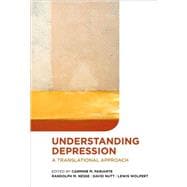
Note: Supplemental materials are not guaranteed with Rental or Used book purchases.
Purchase Benefits
What is included with this book?
| Contributors | p. ix |
| Experiencing depression | p. 1 |
| Depression in the medically ill | p. 7 |
| Explaining depression: neuroscience is not enough, evolution is essential | p. 17 |
| Evolutionary genetics of affective disorders | p. 37 |
| Genetic factors in stress and major derpession | p. 55 |
| Bipolar disorder and unipolar depression: what is the genetic relationship? | p. 67 |
| The significance of dysregulated basal glucocorticoid pulsatility in affective disorders | p. 77 |
| Early life programming of affective function | p. 91 |
| Modelling depression by GR mutant animals? | p. 111 |
| Cytokines and depression: experimental evidence and intermediate mechanisms | p. 123 |
| Do depression, stress, sleep disruption, and inflammation alter hippocampal apoptosis and neurogenesis? | p. 139 |
| The role of the medial prefrontal cortex in mediating resistance and vulnerability to the impact of adverse events | p. 157 |
| Is it all monoamines? | p. 171 |
| The role of affective processing in vulnerability to and resilience against depression | p. 181 |
| PTSD and HPA axis: same hormones, different disorders | p. 193 |
| p. Neuroendocri | |
| Neuropsychiatric effects of IFN-alpha: revelance to depression | p. 223 |
| Depression and coronary heart disease | p. 237 |
| Does depression induce pain and fatigue? | p. 249 |
| Explaining the association between depression and morality: a life course epidemiology approach | p. 261 |
| Depression: unipolar or bipolar, what's the difference (and what does it matter anyway)? | p. 275 |
| Can neuroimaging help distinguish bipolar depression from major depressive disorders? | p. 285 |
| Pharmacogenetics of antidepressant response | p. 299 |
| Can the EEG be used to predict antidepressant response? | |
| Can we use magnetic/electric fields to help in treatment-resistant depression? | p. 333 |
| Antiglucocorticoids in the treatment of affective disorders: from preclinical to clinical studies | p. 345 |
| How can we use current knowledge to improve antidepressant treatments? | p. 371 |
| Index | p. 379 |
| Table of Contents provided by Ingram. All Rights Reserved. |
The New copy of this book will include any supplemental materials advertised. Please check the title of the book to determine if it should include any access cards, study guides, lab manuals, CDs, etc.
The Used, Rental and eBook copies of this book are not guaranteed to include any supplemental materials. Typically, only the book itself is included. This is true even if the title states it includes any access cards, study guides, lab manuals, CDs, etc.